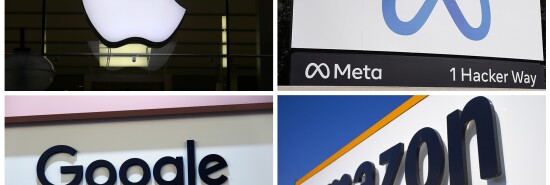
Big Tech is at the forefront of the nation’s epistemological poisoning
Ben Voth
Video Embed
In 2017, my colleague Dr. Robert Denton and I explained that the political public sphere of the United States was being substantially damaged by a circumstance best characterized as “epistemological poisoning.”
Epistemology is the manner by which individuals and/or society know that something is true. In the most mundane form for the everyday person, “googling it” is the manner for this discovery. The overwhelming power of the internet to answer questions brings with it the now ominous reality of the technology companies that are gatekeepers of that vast reservoir. Google, Facebook, and Twitter constitute a nearly insurmountable throttle of information that makes the determinations of daily life and important choices about politics both for people nationwide and an even larger set of sovereigns worldwide.
FREE TRADE IS STILL GOOD FOR AMERICA
Recent revelations from Twitter expose rather clearly how for at least the past three or four years, managers of that internet company engaged in reactionary political calculations that in their most provocative lead, banned a U.S. president from communicating on their platform. That powerful decision is but one of thousands cascading down into a means of communication control that correctly bring to mind the types of symbolic control envisioned by George Orwell’s ominous warnings in 1984.
For all three of these major internet companies, the resounding reassurance is that because they are private companies, there is nothing anyone can or should do about their reactionary and increasingly narrow view of politics. For all of these companies, there must be a profound consideration of the civil rights bright line established in the First Amendment: “The Congress shall not abridge … freedom of speech.”
Congressional authority as established in federal authorities such as the Federal Bureau of Investigation and other similar regulatory agencies extending from congressional authority cannot act to restrain or limit free speech. It appears increasingly probable that organizations such as the FBI and other federal agencies did advise to companies such as Google, Facebook, and Twitter in order to limit people’s freedom of speech. These are civil rights violations, and they cannot go on unpunished without risking further movement of the U.S. away from a society predicated on free expression and one increasingly dedicated to propaganda and subversion of individual dissent.
Such violations can take insidious forms. I noticed recently while coaching my collegiate debate teams this fall that when I asked Google for information regarding the manner by which environmental regulations stifle economic growth, the first several hits were links purchased by the Environmental Protection Agency to promote the exact opposite of the information I was looking for to help my debaters engage in critical thinking on this topic. These recommended articles suggested that environmental regulation actually increases economic growth rather than harms it.
Because the U.S. federal government is the largest employer in the U.S., the actions of federal agencies within these domains of Google, Facebook, and Twitter easily constitute a powerful shadow and threat to free expression. Congress should exert a more proactive oversight regarding all of these organizations, and the Justice Department should supervise these activities with a nonideological understanding that freedom of speech is an inherent necessity, not a component of a cost-benefit analysis wherein the Justice Department considers the ideological benefits of selective prosecutions to shape America’s political landscape.
It is apparent that emerging artificial intelligence tools hold the potential to supplant current internet technologies. AI chatbot software can cull the internet in a manner that could replace search engines such as Google. The internet that these AI agents are scanning has been shaped by powerful political forces that may reinforce ideological and reactionary forces and move us toward ideological fascism rather than away from it. Congress’s habit of unleashing radical federal government powers in the name of public safety casts a shadow against creativity and dissent. This social wellspring of discursive complexity is jeopardized by the insatiable security interests of a federal government that spends trillions of dollars each year and increasingly cannot fully document or account for this spending.
Professor Denton and I argue that the well-being of the U.S. is intimately attached to its central praxis of free speech. The consideration of multiple points of view enables discoveries in science, medicine, and politics that contribute to human well-being. The rather shocking stoppage of life expectancies increasing around 2015 points to a correlation with technologies more efficient at constraining rather than expanding human creativity.
These constraints are evident in global problems such as perpetuating radical closed societies such as those maintained in China through intensive internet controls. Apple’s recent decision to turn off Bluetooth functions to phones largely manufactured in the controlled economy of China points to the value of dissent in potential global political reform and the dangers of the current technology monopolies such as those found in Apple, Google, and Facebook.
Apple actively stifled dissent in China due to its profitable relationship with the communist government of that nation. The U.S. must reestablish itself as the foremost proponent of dissent and free speech both at home and abroad. Without such a political practice, our own well-being at home will be stifled and perhaps further pressed into decline. Moreover, the well-being of 8 billion people looking for solutions beyond the narrow minds like those ruling in Pyongyang, Tehran, and Beijing will be equally doomed. The recent revelations of reactionary ideological manipulations within Twitter offer an opportunity for everyone to renew our commitment to the goal of a free and open society.
CLICK HERE TO READ MORE FROM THE WASHINGTON EXAMINER
Dr. Ben Voth is a professor of rhetoric and director of debate and speech at Southern Methodist University. He is also editor of Argumentation and Advocacy, Calvin Coolidge Presidential Foundation debate fellow, and author of five books on political communication, including his forthcoming book on the presidential rhetoric of Woodrow Wilson, Warren Harding, and Calvin Coolidge.
